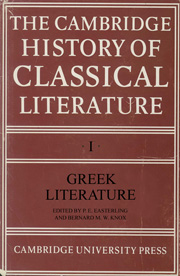2 results in The Cambridge History of Classical Literature

The Cambridge History of Classical Literature
-
- Published online:
- 28 March 2008
- Print publication:
- 09 May 1985
The Cambridge History of Classical Literature
-
- Published online:
- 28 March 2008
- Print publication:
- 18 March 1982

